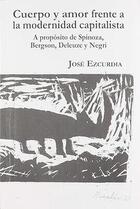
After the publication of Spinoza, mystic or atheist? Immanence and love in the nascent Modern Age; Time and love in the philosophy of Bergson, and Body, intuition and difference in the thought of Gilles Deleuze, José Ezcurdia addresses in this work the significance of the major theses of philosophical vitalism in the face of its determination as a critical horizon of capitalist modernity. In this context, vitalism constitutes a necessarily materialist dimension in which the body plays a fundamental role: the body, as the capacity to affect and be affected, is resolved as an immanent motor of a liberation struggle in which production of the pure affection of love appears as the heart of an active individual and society that stands up as a space of resistance against a capitalism that has taken the national State hostage.






